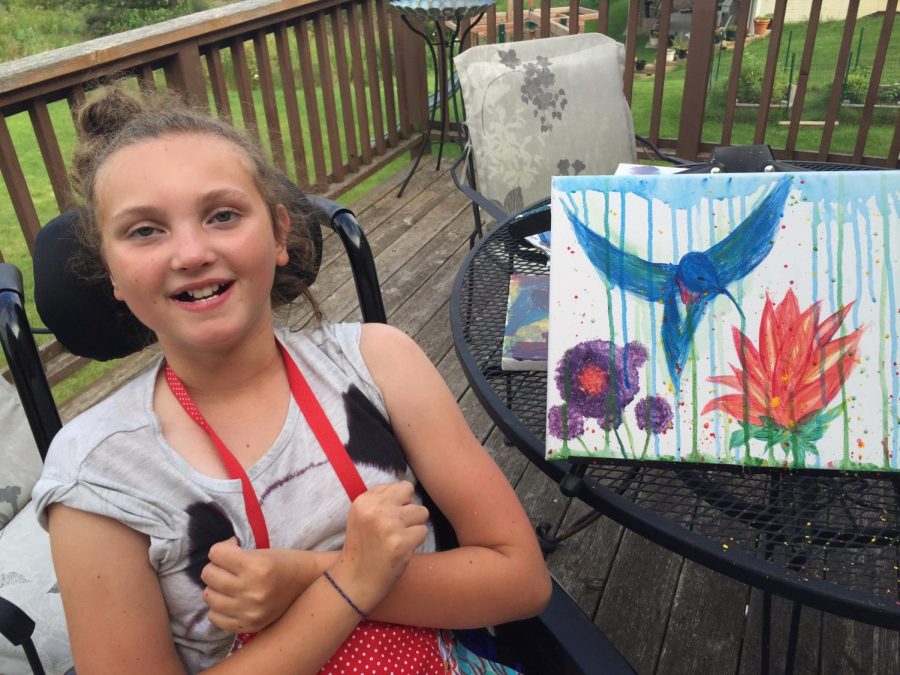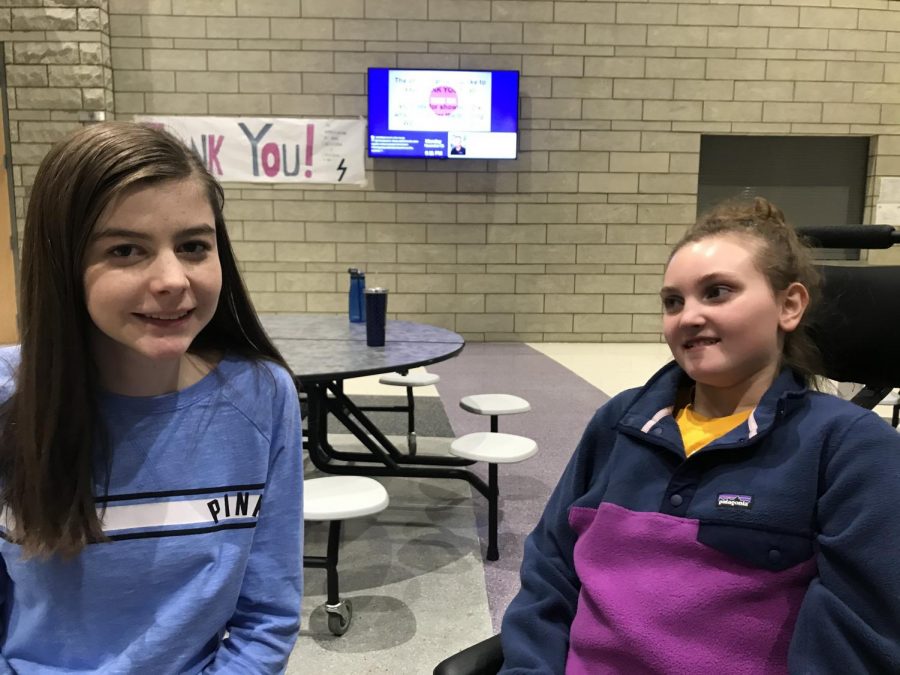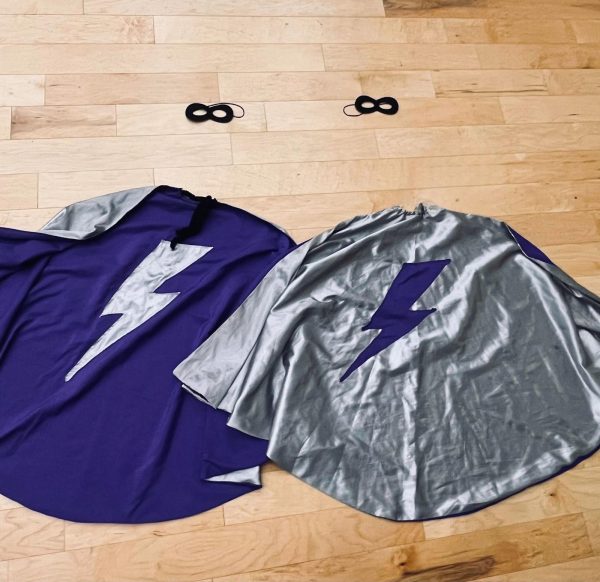Anna Bilskemper: Battling Rett Syndrome
1 in 10,000 females are diagnosed with Rett Syndrome. Anna Bilskemper, freshman, is that 1 in 10,000.
Courtesy of Melanie Bilskemper
Anna with a painting she made of a hummingbird and flower.
Until Anna Bilskemper, was 14 months old, she was a normal child. She was advanced in speech, a beautiful singer, and her fine motor skills were perfect. But, in June of 2006 Anna woke up screaming. Anna could no longer use any words. Her mother, Melanie Bilskemper, took her to see a neurologist at the University of Iowa Hospitals. They ran a series of tests, which resulted in a diagnosis of Rett Syndrome.
Rett syndrome is a rare non-inherited genetic neurological disorder. It causes severe impairments that affect almost every aspect of life including speech, the ability to walk, the ability to eat, and the ability to breath easily. Rett Syndrome is very rare and even more rare in males (Rett Syndrome.org).
“The diagnosis was devastating to [my husband] and I,” said Melanie. “We went from having a happy, healthy baby with limitless possibilities and opportunities, to a baby that, over night, would never again be able to speak, sing, or write her thoughts and feelings.”
While it has long term effects on Anna’s parents and family, it impacts Anna the most. At the beginning, she was angry when she couldn’t communicate. At around 18-19 months, Anna lost her ability to use her hands. It progressed to losing the ability to crawl and pull herself.
“I can remember having friends over for a play date. I stepped out of the room, [and] when I returned, she was watching the other children play with her toys, tears were rolling down Anna’s cheeks,” said Melanie.
Rett Syndrome is often diagnosed with a blood test to identify a mutation in the X chromosome on a gene called Methylcytosine-binding protein 2, or MECP2. Rett Syndrome can vary in severity of symptoms or progression. Most often, symptoms begin to show in female infants between 6 months or 18 months old. There are rare cases where it can affect infants younger than 6 months and their muscle tone or head growth (National Organization for Rare Disorders).
“Rett is caused by a protein in their DNA that interrupts the cells ability to function correctly. It’s just a protein, but it causes devastating symptoms,” said Melanie.
Treatment for Rett Syndrome includes many different types of therapies, learning techniques, and assistance opportunities. Physical therapy and hydrotherapy can help improve mobility and balance. Occupational therapy can help to improve hand use. Speech and language therapies can improve communication and social skills. Anna has been going to physical therapy and speech therapy since she was 18 months old. She has also done hippotherapy (horseback riding) and water therapy.
“There are lots of difficult challenges for Anna, but when asked what she would want back, she always chooses the ability to speech,” said Melanie.
Anna’s inability to communicate her knowledge, leaves her completely dependent on others. This is very prominent in her school work. Anna must spend two to four hours after school competing homework with a caregiver. Despite it being a challenge, Anna loves school.
Anna is involved in Liberty’s club Best Buddies. Her buddy and friend is Rachel Spence, junior. Besides Best Buddies events, Spence and Anna connect at lunch everyday. They often meet outside of school where they paint and play cards.
“Seeing Anna brightens my day because she has a very kind heart and she has been very patient with me as I have been trying to communicate with her,” said Spence.
Anna communicates mostly through eye contact. Looking directly at you means yes, and away means no. She also has a tablet that can be used for communication. Learning to communicate with Anna has been a challenge for Spence, but it has been worth it. As a result, they have created a great friendship.
“Anna is just like everyone else. Go up and talk to her; she is so much fun to talk to and is so kind. I think everyone would love her if they met her,” said Spence.
Anna is like any normal high school girl. She likes reading, movies, musicals, theater, watching most sports, boating, hiking (special jogger), painting and other forms of art, cooking and watching comedians. She loves having family and friends around.
“She is a very caring, smart, funny girl, trapped in a body that doesn’t work. Life is hard for Anna, but she is patient and hardworking,” said Melanie.
While Rett Syndrome has no known cure yet, scientists and doctors are getting closer and closer each day. Successful experiments on mice have created drugs that could in the future help reverse symptoms of Rett Syndrome.

Kaylee Deisbeck, senior, is in her second year a part of the Live Wire staff. She plays soccer and is involved in multiple school clubs including Difference...















